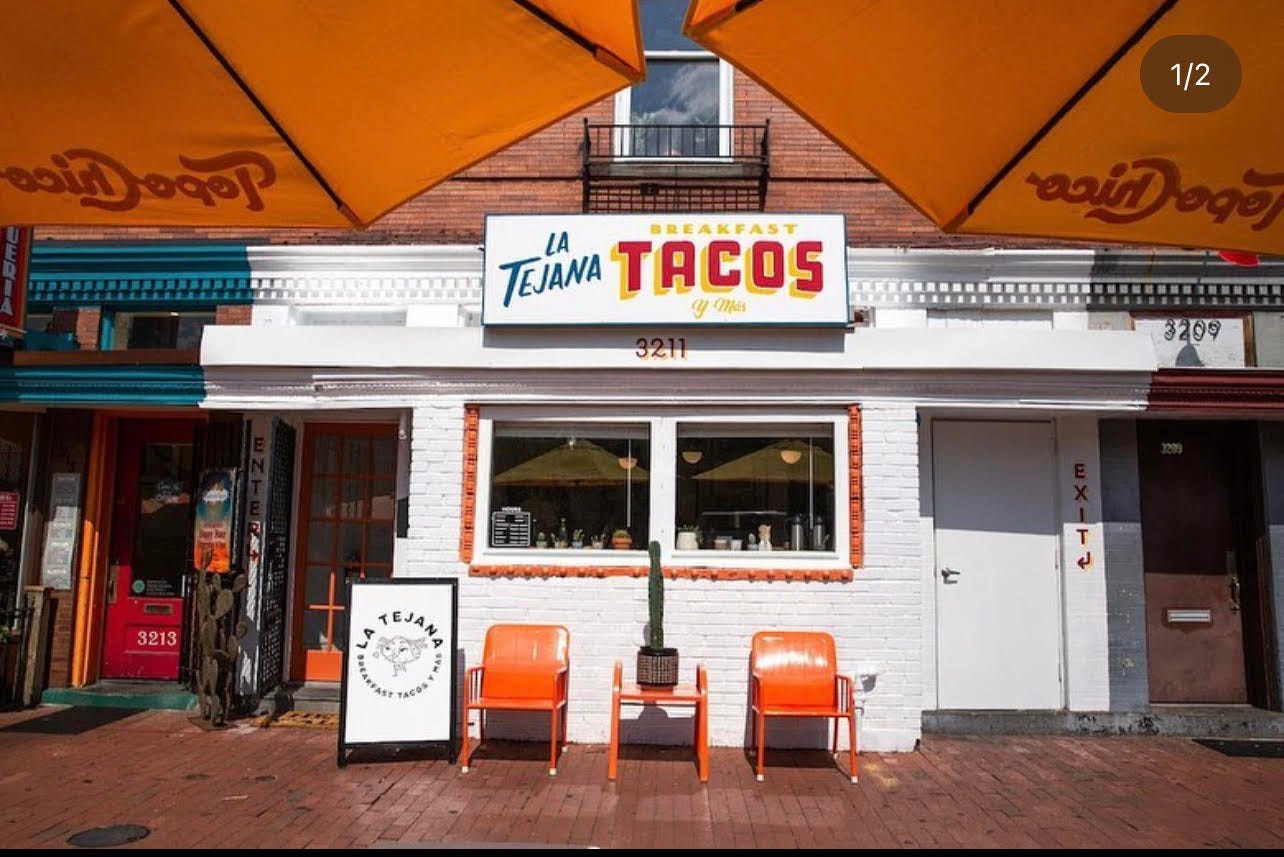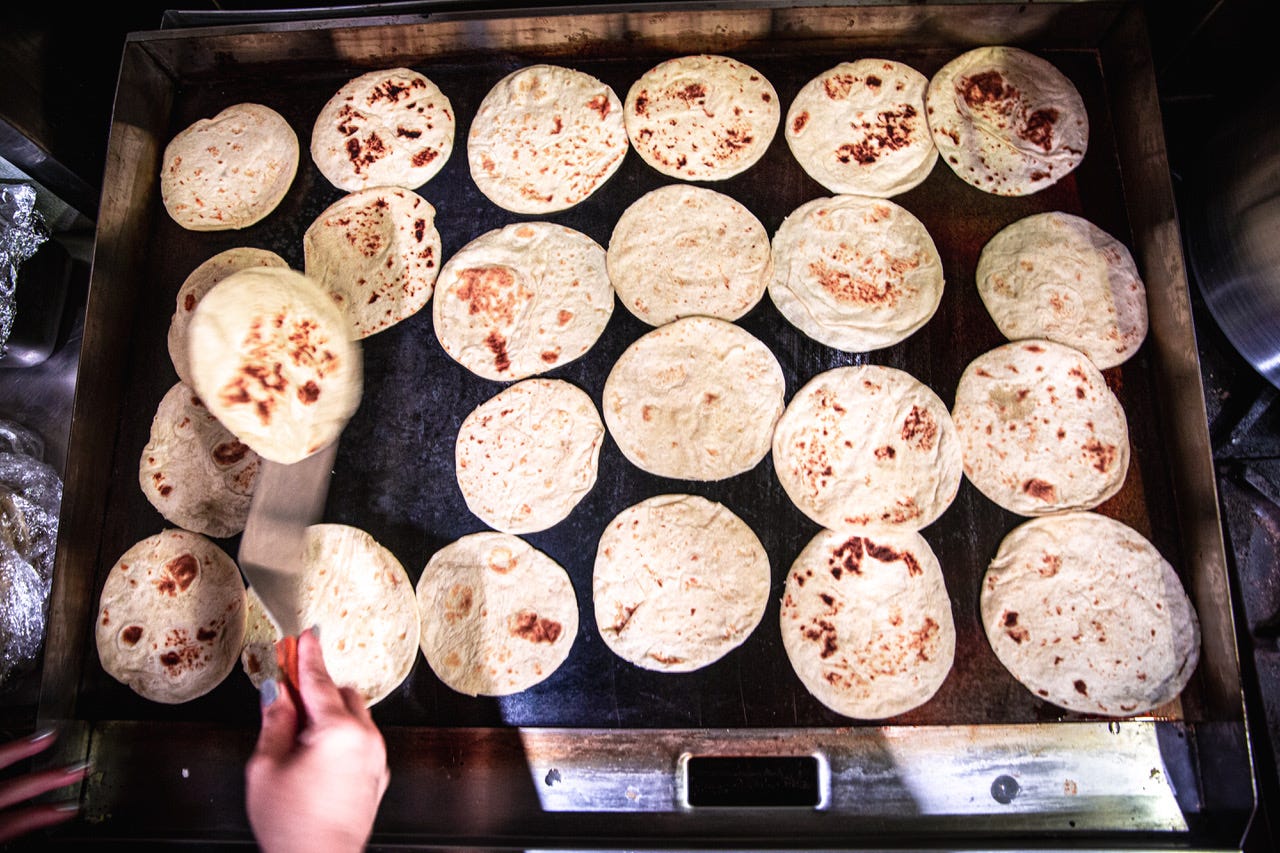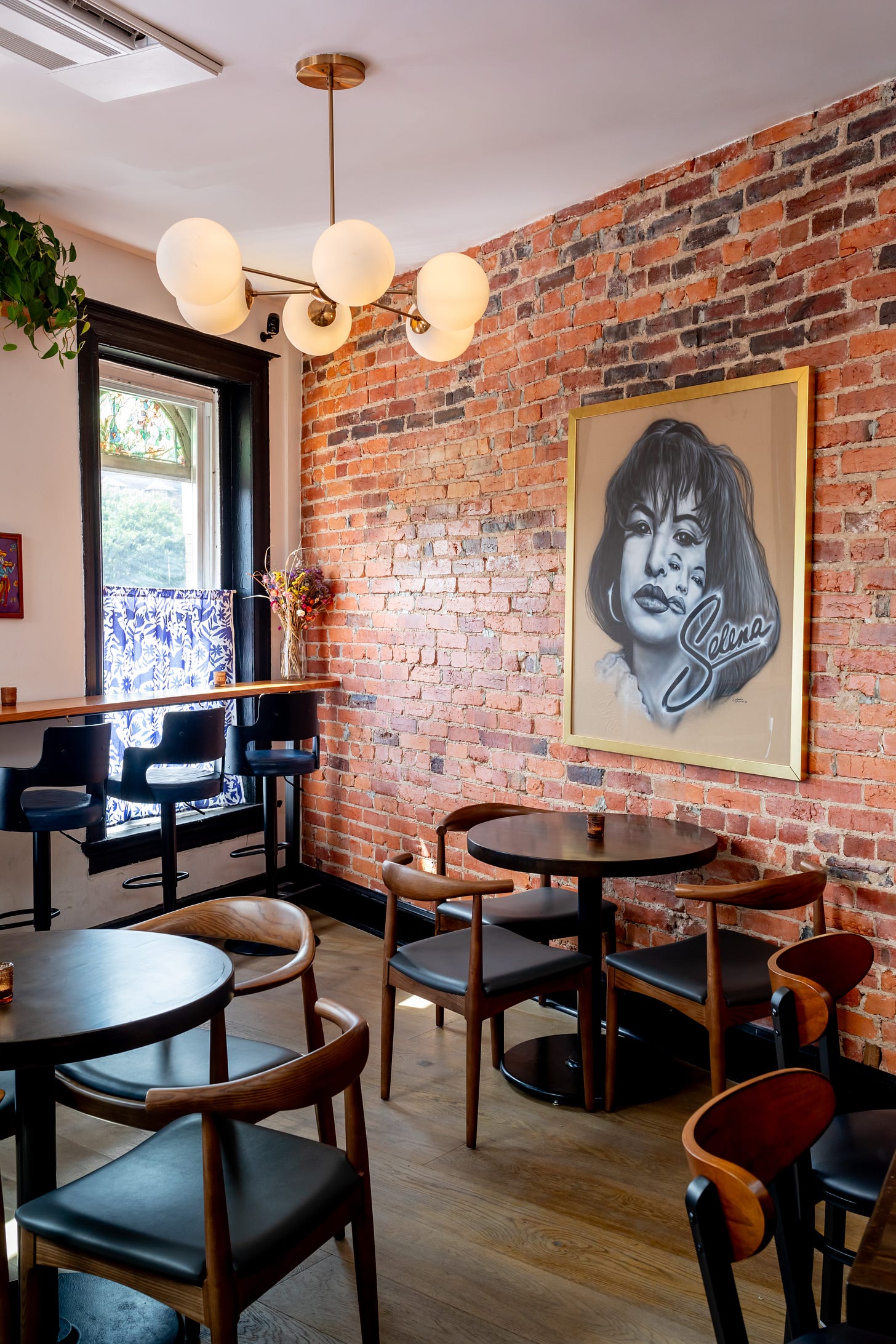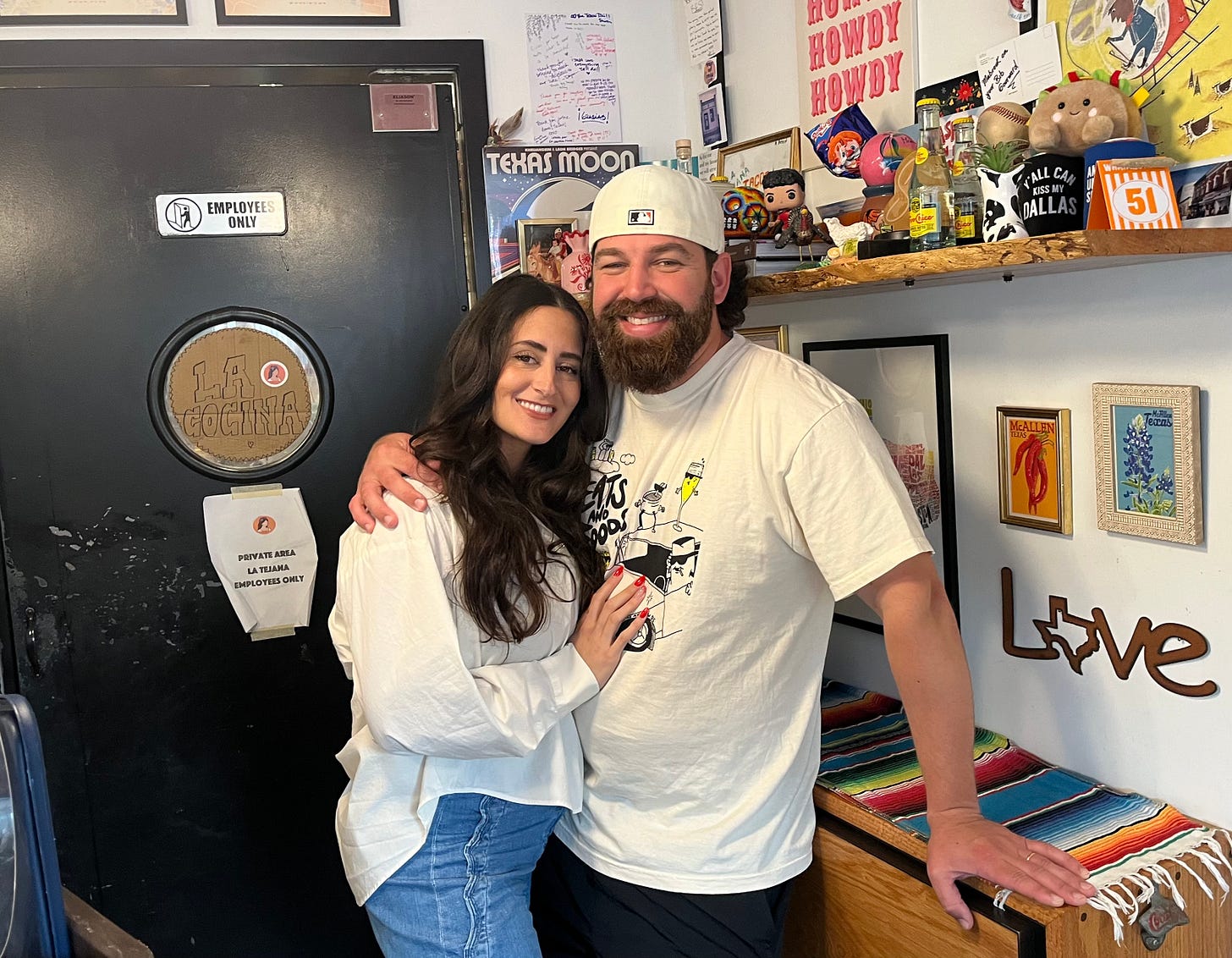If you asked me to describe my perfect day, it would start with breakfast tacos and a big iced coffee at La Tejana. I’m from New England and can’t pretend to be an expert on Rio Grande Valley breakfast cuisine, but what I can say is that these tacos are exquisite. They taste like a hug. No offense to babies, but this is the definition of a “bundle of joy”: warm tin foil packages weighty with eggs and bacon and cheesy beans wrapped in chewy flour tortillas. Douse them in cilantro crema salsa and feel your affection for humanity expand tenfold.
I know I’m not the only one who feels this way. On weekend mornings, the line outside La Tejana’s small storefront in Mount Pleasant, a low-key and leafy neighborhood in D.C., stretches down the block. The shop — white brick with orange trim and matching patio seating outside — opened in 2022 and quickly developed a fan following, landing all kinds of glowing coverage and Bib Gourmand recognition from the Michelin Guide. Despite turning out breakfast tacos with astounding speed (that line will move faster than you expect), La Tejana’s team keeps the vibes in the store extremely chill. I love going to a packed bagel shop in New York and getting barked at by the intimidating guy behind the counter, but this is an altogether more friendly experience.
The owners of La Tejana, Ana-Maria Jaramillo and Gus May, have been on my wish list for “The Most Interesting Person People in D.C.” for a long time. First of all, they’ve built a beloved neighborhood institution in just a few short years (culturally interesting). Second, they figured out how to run a very well-oiled machine (technically interesting). And third, the story of La Tejana is the story of their romance, with a breakup and tough truths along the way (interesting to anyone with a beating heart!).
I dropped by La Tejana this past week for a wide-ranging conversation with Ana-Maria and Gus in their upstairs dining space, which is open for cocktails and food in the evening. Our chat was so compelling that I’ve decided to break it into two parts — here’s the first one, with part two to follow shortly.
Let’s get into it. I’m so hungry now.
I would love to hear the origin story of La Tejana. From what I’ve read, it came out of a breakup?
Ana-Maria: Gus and I met at a wedding of a mutual friend on Memorial Day weekend eight years ago. We fell in love immediately. I was fighting the urge to fall in love because I lived in Texas, and I loved my life there. He lived here, and I thought doing long-distance was crazy. But we kept up through every single platform — Snapchat, Instagram — and we fell more and more in love.
Gus: That was Snapchat era. 2017. She was in New York a week after the wedding. We saw each other two weekends back-to-back, then started dating long-distance.
Her 29th birthday was in August, in Austin. I’d never been to Texas — I’m from the Northeast. I was never moving to Texas — I made that abundantly clear — but I was down to visit. We went out, partied, and she sent me out for breakfast tacos from her favorite place, Taco Joint. In a moment of hungover bliss, eating these tacos, I was jokingly like, “If this thing works out between us, we should open a breakfast taco joint.”
Ana-Maria: In D.C., to be clear. Austin was never going to happen.
Gus: Ana moved to D.C. five or six months later. I was working in catering at the time, and later that year I worked at Domestique — which is how I know Eric [Moorer, of Gemini] — while also working as a server at Ellē. I was trying to figure out what to do, and Ana was pushing me to be more ambitious. She was like, “What’s the plan?”
Ana-Maria: Like, I’m trying to get married, have kids… what are we doing here? Because my life was so figured out. I had already launched my speech pathology practice, the Voz Institute. I was hustling all over D.C.
And by the way, do you still have your practice? On top of owning the restaurant?
Ana-Maria: I do. It’s grown so much. And I was a professor at GW, but I’ve since stopped.
Oh my god, that’s so impressive.
Gus: She’s also pregnant, so we’re trying to take more off her plate!
Congratulations! That’s so exciting. So at the time, you were hustling, and Gus was trying to figure his career out.
Gus: The idea of a breakfast taco place kept coming back to me. I was bouncing the idea off people and starting to practice making tortillas. Ana knows the food really well — it’s what she grew up with — but she doesn’t come from a food service background. The idea of large-scale cooking wasn’t her forte, but I had that background.
Ana-Maria: I had the palate.
Gus: I started messing around with the tortillas, bringing them into Ellē and having the chefs try them. I finally felt good enough about the recipe for the tortillas, and we had a little tasting for friends. I asked Nick [Pimentel], one of the co-owners of Ellē, if we could do a pop-up at one of his other places, Room 11, which was a neighborhood cocktail bar and huge restaurant industry hub. He offered the space to us. That was right before Covid, December 2019. We had back-to-back Saturday pop-ups, and they were huge sell-outs.
At the same time, Ana was doubting our relationship, and we actually broke up.
Ana-Maria: It was Halloween weekend. I went back to Austin and was like, I need my friends to tell me that it’s okay to break up with him. I had moved my entire life here and started my practice. I needed them to tell me I deserved better, and they gave that to me. As soon as I got off the plane in D.C., I told him we needed to break up. It was okay — we loved each other — but we were in different places.
He went to live with his parents in Takoma Park while I moved out. It was during this period, between October and December, that he told me, “Hey, I know you broke up with me because of my career. But I have this pop-up booked.” And I was like, “What?” I couldn’t believe it was actually happening, because it had just been a dream, and I didn’t see a lot of momentum in him. It had been frustrating because I was like, “You have it in you! But I can’t be the one to tell you. You have to believe it.”
It was that pop-up that resolidified our whole relationship. I already had a place set up in Austin, but I decided to stay here in D.C.
Then the pandemic happened, and it was like, what do we do with this business? We had been having pop-ups, and in March, they closed everything down. Gus got laid off from Ellē. My practice was going nowhere because kids and teletherapy are not a match. Gus was like, “What if we just make tortillas at home?” One of our friends, Peter Franklin Chang, who was behind No King’s Collective and now has his own business — he’s a famous artist here — had sent Gus a message asking for some tortillas.
Gus: We started doing tortilla deliveries. That’s how we stayed relevant.
Which was huge during Covid. I was living in New York at that time, and the fact that our favorite dumpling spot was selling big plastic bags of 50 frozen dumplings was a godsend. Having special food like that made you feel like a person again.
Gus: We just did the tortillas as a flash sale on Instagram, and we would get flooded with DMs. We sold a dozen for $7. We were cooking out of our apartment in Mount Pleasant and making as many as we could.
Ana-Maria: Rendering our own lard.
Gus: The owner of Thamee, a Burmese restaurant, had been at the Room 11 pop-up. She closed down her restaurant when Covid hit, and she was in the process of reopening in a takeout capacity and asked if we’d want to be part of it. They would sell drinks, and we’d sell our food.
Ana-Maria: They had amazing Vietnamese coffee and butterfly flower lemonade.
Gus: From then on, we became a nomadic pop-up, wherever would take us. We popped up at Grand Duchess, Nido, Serenata inside La Cosecha, Other Half Brewery in Ivy City. We made a lot of connections through it.
Ana-Maria: Tim Carman from the Washington Post came.
Gus: We were in his top casual restaurants of the year. And we were still a pop-up!
Ana-Maria: And then we got tired.
Gus: Ana was like, “I can’t do this shit anymore.” She would work her full-time job, and then do pop-ups Saturday and Sunday, waking up at 6 a.m. Every single week.
Ana-Maria: He was waking up at 3 a.m. to make tacos. He wouldn’t sleep.
Gus: I remember on New Year’s, I was out until 1 a.m., went to the ghost kitchen, slept for an hour, and started cooking.
Ana-Maria: The question of opening a restaurant started floating around. I have to give Gus a shout-out, because he’s so incredible with numbers and business. He was like, “We’re going to be as nimble as possible until the numbers make sense for us.” He was so frugal during pop-ups.
Gus: I hired a little bit of part-time help to do tortillas, but I would do everything else myself.
Ana-Maria: We heard about this spot, where La Tejana is now, through Chef Demetri [Mechelis] at Martha Dear down the street. His father’s best friend is our landlord.
We signed the lease in January 2022. We got married in April. Construction started the day after our wedding. Then we opened our doors August 7, 2022. So much has evolved since then, but we’re still very true to our pop-up. We’ve added a few tacos, but for the most part, we’re rocking with the same menu, the same vibes. Our staff is pretty much the same. We’re very, very close to them at this point.
Gus: Some of our team has been with us upwards of three, four years.
Ana-Maria: The bar opened in May of last year. We’re still tweaking the concept.
I have been wondering about the evolution of the bar and evening food service, since those are relatively new.
Ana-Maria: When we first opened, we only built out the main floor because of money [limitations]. We wanted to gut the upstairs and do something with it. We met a local bartender here, Jose Cox, who used to be our lead bartender, and he pitched the idea of doing really dope craft cocktails. We were so happy with the cocktail menu, but we realized that there are a lot of places to get cocktails in Mount Pleasant.
In January, we decided to do something that you would find in Texas. After living in Austin for 12 years, I’d been to almost all of the bars there that were Tex-Mex focused. Now we sell cocktails with our twist — a Texas tini, a spicy marg, a shot and a beer.
Gus: The nighttime concept started out as pretty elevated, and we discovered that people really want the basics. There are a few cocktails that are popular, but we sell more margaritas than anything. We have so many regulars during the daytime because it’s quite affordable — you come here, drop $20, and you’ve got coffee and a meal. At nighttime, $20 would get you one drink. We wanted to bridge the gap and make it more approachable and more consistent with who we already were.
Nighttime, honestly, is kind of like a bonus.
That actually makes a lot of sense to me. You own breakfast.
Ana-Maria: People have no clue that we have cocktails at night.
Gus: Our name recognition is so connected to breakfast. I think that it’s still an ongoing process of enlightening people that we’re also open at night. Even if we open up more [locations], I think breakfast will always be our thing.
Ana-Maria: When we open up more.
Okay…
Gus: We’re thinking about number two.
Ana-Maria: Very seriously. We’re looking.
Gus: We’re casually looking. The broker’s not working too hard.
Well, I look forward to that when it happens! Gus, I have a question for you. Not to dredge it all up, but I was really struck by what Ana was saying about needing to see you treat your career differently. I related to you in that moment because my husband, Alex, and I are both freelance, and there have been times when he’s said to me, “I think you can be more ambitious — pitch tougher stories, push for a higher standard for yourself.” He was never saying that I wasn’t working hard, because I was, but that I was holding myself back a little bit. And that can be really hard to hear.
Gus: Ooooh. Absolutely!
And he was right. Any time you decide to pitch a story that you don’t think is going to go anywhere, and it gets accepted, you realize you can actually do that kind of work. So I’m wondering how that growth has been for you.
Gus: I felt like the way that Ana was pushing me, at times, was unproductive. I knew that she was right. But I had feelings around the way that she was trying to motivate me, from what I perceived to be a place of judgment or shame. I did not process that well. At the same time, it was still motivating, if that makes sense.
Gus, that makes complete sense.
Gus: I think that my confidence really grew as the success of La Tejana grew concurrently.
Ana-Maria: But the breakup fueled that, wouldn’t you say?
Gus: It for sure motivated me to show that the breakfast taco idea could succeed. But even with the seed planted that it could work, the restaurant industry is frail. You’re only as good as your last service, in my opinion. You can have a big reputation, and people can have a terrible experience and never want to come back. Places seen as institutions close right and left.
The margins are super thin, right?
Gus: Yeah. It’s a tough business. We pay our people really well. We offer benefits and paid time off, and that’s rare. There are so many challenging factors to operating a restaurant successfully. But my point is that the confidence didn’t set in until years later.
Ana-Maria: But you taking that first leap, I had never seen that from you before. The Gus that I knew was the Gus who was very unhappy with his current job. He would complain about it all the time. But I wouldn’t see him actively seeking out other things.
Gus: Or I would be doing it, but incrementally.
Ana-Maria: I’d ask him if he’d worked on his resume, and it would become a fight. That resentment led to the breakup.
[Finally] Gus decided to see what the breakfast taco idea could lead to. He asked all of his friends for help, and they stepped in and made it happen. Once he got his first taste of success, things started to click for him, and he started to put himself out there every single weekend. He was having meetings, calling people. He was so unafraid. And I was like, “That’s the man that I want to marry.”
Hungry for more? Read part two of our interview now! We get into how Ana-Maria and Gus’s team turns out so many breakfast tacos every day — 1,500 to 2,000 on a Saturday! — as well as their favorite places to eat in D.C. and the surrounding suburbs.
My order is a 956 and a Súper Migas (plus a Frijolito if I have a big day ahead),
Eliza








